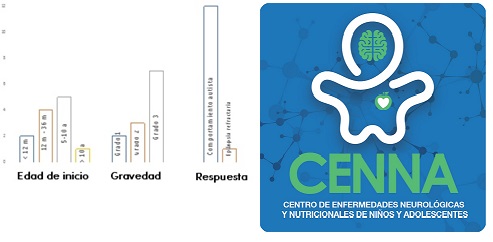Relationship between autism spectrum disorder and epilepsy in a pediatric population in Quito-Ecuador Original Research
Main Article Content
Abstract
Introduction: Compared to the general population, there is a higher prevalence of epilepsy in children with autism spectrum disorder (ASD), with an indecency of approximately 20%. There is no plausible mechanism for ASD as a cause of epilepsy; however, its cooccurrence is surely the result of predisposing factors for both conditions, including genetic and environmental factors. The objective of this study was to establish the prevalence of epilepsy in patients with ASD and find a correlation with other factors, such as sex, etiology, type of seizure or epileptic syndrome, age of onset of epilepsy, EEG abnormalities, and therapeutic response.
Methods: A retrospective longitudinal study was carried out based on the clinical records of the Center for Neurological and Nutritional Diseases in Children and Adolescents (CENNA) of 81 patients (3-19 years) with a diagnosis of ASD, where patients coexisted with epilepsy for a period of 6 years, and the different variables in this group.
Results: Eighty-one patients with a diagnosis of ASD were identified, of whom 12 patients (15%) had coexisting epilepsy. When analyzing the degree of ASD, it was evidenced that comorbidity in both entities is more common in ASD grade 3 (58.33%). The age of onset of epilepsy ranged between 5 and 10 years (42%). Twenty-five percent of patients had a family history of epilepsy, while only 8% had a family history of ASD. All types of epileptic seizures occurred in patients with ASD, but the most common were focal-type seizures (58%), specifically motor seizures with altered consciousness (33%). In addition, there was a 100% improvement in autistic behavior in the patients who received their antiepileptic treatment, and only 8% had difficult-to-control epilepsy.
Conclusion: The study showed a significant prevalence of epilepsy in the population diagnosed with ASD. The study managed to observe the distribution of the population with comorbidities of ASD and epilepsy to find a common variable between both pathologies in the future. To our knowledge, this is the first retrospective study in Ecuador that analyzes the comorbidity of ASD and epilepsy in the Ecuadorian population.
Downloads
Article Details

This work is licensed under a Creative Commons Attribution-NonCommercial-ShareAlike 4.0 International License.

